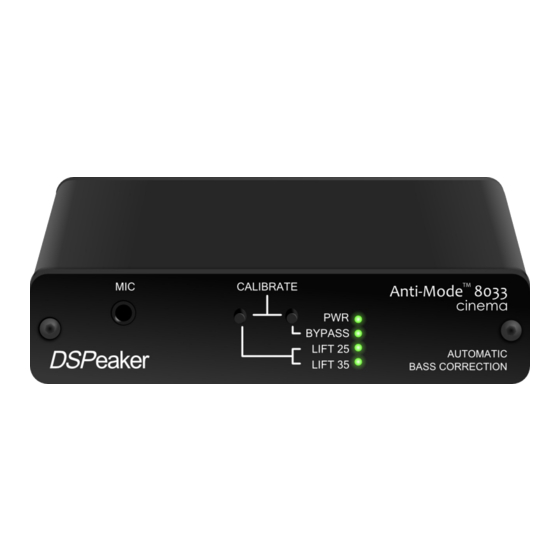DSPeaker Anti-Mode 8033S-II Manual do utilizador - Página 14
Procurar online ou descarregar pdf Manual do utilizador para Stereo Equalizer DSPeaker Anti-Mode 8033S-II. DSPeaker Anti-Mode 8033S-II 20 páginas. Automatic subwoofer equalizer

A
-M
8033
/ 8033S-II
NTI
ODE
CINEMA
The level warning is also active during calibration. During calibration the output level is decreased
automatically if needed (microphone is saturated). The LIFT25 LED flashes to indicate the
progress of calibration.
4.4. Output Level Warning
The new Anti-Mode correction will raise the overall level of the output depending on how drastic
corrections were applied. This increase and an active lift mode can increase the output level in
some frequencies so much that the signal gets saturated in the output. In this case the LIFT25
LED starts to flicker, and you should decrease the Anti-Mode 8033 input level or turn off lift mode.
4.5. Powering Up and Down
Anti-Mode 8033 cinema and Anti-Mode 8033S-II have almost no power-on and power-off
transients, so you can easily power them on and off using a switchable power cord or the
switchable power output from your AVR.
Anti-Mode also fades in when the signal starts, so it can be powered on without transients even
while the audio signal is already applied to the input connector(s).
Because the Anti-Mode consumes very little power, you may choose to leave it powered on.
4.6. Low-pass Filter Selection (Anti-Mode 8033S-II)
Anti-Mode 8033S-II allows you to select additional filters that remain active while in bypass mode.
Activate Neutral mode if you want to disable low-pass or dipole correction modes.
The low-pass filters are useful when the main speakers cannot reproduce very low frequencies
and the system does not have an adjustable cross-over. You can then select the suitable low-pass
frequency to match the natural roll-off point of the main speakers.
Dipole (open-baffle) subwoofers have a natural roll-off of 6dB per octave. If the subwoofer does
not already have a correction circuit to counteract this, the bass will be lacking when the lower
frequencies are reproduced. The dipole correction modes are designed to provide the necessary
6dB/octave boost to the lower frequencies. Because the dipole correction boost is also active
during calibration (the lift modes are not), the Anti-Mode correction will work as it was intended and
does not unnecessarily attenuate the higher bass frequencies when it tries to even out the
response.
Rev. 2.0
18.06.2012
Page 14 (20)
